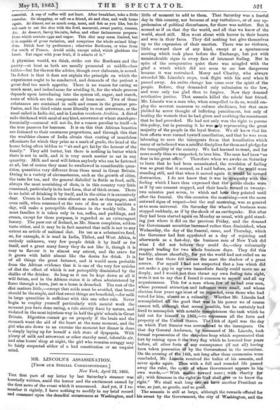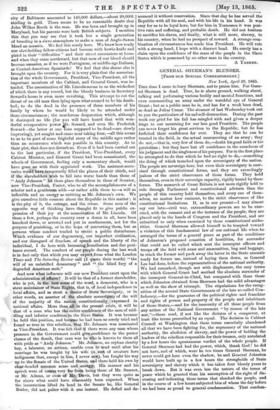MR. LINCOLN'S ASSASSINATION.
[Faces OUR SPECIAL CORRESPONDENT.]
New York, April 22, 1865. THE first part of my letter by last Saturday's steamer was hurriedly written, amid the horror and the excitement caused by the first news of the event which it announced. And yet, if I re- member it rightly, I have nothing to modify in my brief record and comment upon the dreadful occurrences at Washington, and little of moment -to add to them. That Saturday was a fearful day in this country, not because of any turbulence, or of any ap- prehension of political disturbance, for -there was neither. But it seemed as if on that day the world, and all that we knew of the world, stood still. Men went about with horror in their hearts and woe in their faces. They did nothing but give themselves up to the expression of their emotion. There was no violence, little outward show of any kind, except at a spontaneous meeting which took place before the Exchange, but yet with unmistakeable signs in every face of intensest feeling. But in spite of the comparative quiet there was mingled with the grief a wrath which did not seem to me less dangerous because it was restrained. Mercy and Charity, who always attended Mr. Lincoln's steps, took flight with his soul when it passed away. An entire change has come over the spirit of the people. Before, they demanded only submission to the law, and were only too glad then to forgive. Now they demand retributive justice. That assassin killed the rebels best friend. Mr. Lincoln was a man who, when compelled to do so, would em- ploy the severest measures to enforce obedience, but that once yielded he never thought of inflicting punishment, but only of healing the wounds that he had given and soothing the resentment that he had provoked. He had not only won the right to pursue this policy, but in pursuing it he was say representing the great majority of the people in the loyal States. We all knew that his best efforts were turned toward conciliation, and that he was even labouring to save the insurgents from that humiliation which many of us believed was a needful discipline for them and pledge for the tranquillity of the country. We had learned to trust, and far more nearly than we suspected, to love him. The man had been "so dear in his great office." Therefore when we awoke on Saturday to learn that he had been assassinated, the revulsion of feeling was so great that it seemed, as I said before, as if the world were standing still, and that when it moved again it would be toward destruction. I do not know that it was in sympathy with the feeling which I have thus expressed that the public clocks were as if by one consent stopped, and their hands &timed to twenty- two minutes past seven, to which sad hotly, they pointed until after the funeral. On this occasion the mourning—not the mere outward signs of respect—but the real mourning, was so general as to seem universal. On Saturday the wheels of business were stopped suddenly, as if by the shock of an earthquake. But after they had been started again on Monday as usual, with gold stand- ing just where it did on the previous Friday, and the demand for Government securities increased rather than diminished, when Wednesday, the day of the funeral, came, and Thursday, which the Governor had first appointed as a day of rejoicing and afterwards as a fast-day, the business men of New York did what I did not believe they could do,—they voluntarily stopped trading for two whole business days. They did this readily, almost cheerfully, for yet the world had not rolled on sb far but that there fell across the mart the shadow of a great sorrow. For myself I had not suspected that a loss which did not make a gap in my own immediate family could move me so deeply, and I would not thus thrust my own feeling into sight, were it not to say that I found it common to myself and all my
acquaintances. This for a man whom few of us had ever seen, whose personal attraction and influence were small, and whose election four years ago most of us regarded, even those who had voted for him, almost as a calamity. Whether Mr. Lincoln had accomplished all the good that was in his power we of course cannot tell, although that seems possible, but he certainly had lived to 'accomplish with notable completeness the task which he laid out for himself in 1861,—to repossesss all the forts and property of the United States. The 14th of April was the day on which Fort Sumter was surrendered to the insurgents. On that day General Anderson, by oommand of Mr. Lincoln, took formal repossession of the shapeless heap which represented that fort by raising upon it the Tory flag which he lowered four years
before, all other forts of any consequence (if not all) having been taken possession of by the Govermnent in the meantime.
On the evening of the 14th, not long after these ceremonies were concluded, Mr. Lincoln received the bullet of his assassin, and never spoke again. Thus with a full .and rounded life passed away the ruler, the spirit of whose Government appears in his own words,—" With malice toward none ; with charity for all ; with firmness in the right as God shall give us to know the right." We shall wait long ere we have another President so wise, so just, so gentle, and so good.
The assassin is still at large, although the rewards offered for his arrest by the Government, the city of Washington, and the city of Baltimore amounted to 140,000 dollars,—about 20,0001. sterling in gold. There seems to be no reasonable doubt that John Wilkes Booth is the man. He was born and brought up in Maryland, but his parents were both British subjects. I mention this that you may see that it took but a single generation of breeding in a slave atmosphere to make a man of Anglo-Saxon blood an assassin. We feel this sorely here. We knew how ready our slaveholding fellow-citizens had become with bowie-knife and pistol in their " difficulties " and their street encounters at home and when they came northward, but that men of our blood should become assassins, as if we were Portuguese, or middle-age Italians, or Central-American Spaniards! We feel that this shame also is brought upon the country. For it is very plain that the assassina- tion of the whole Government, President, Vice-President, all the important members of the Cabinet, and General Grant, was in- tended. The assassination of Mr. Lincoln seems to us the wickedest of which there is any record, but the bloody business in Secretary Seward's house is even more revolting. This attempt to cut the throat of an old man then lying upon what seemed to be his death- bed ; to do the deed in the presence of those members of his family by whom he would be likely to be attended under those circumstances ; the murderous desperation which, although it destroyed no life (for you will have heard that with won- derful recuperative power yr. Seward, and even Mr. Frederick Seward—the latter at one 'Time supposed to be dead—are slowly improving), yet sought and came near taking four,—all this seems to us to be part of some frightful story of the middle ages rather than an occurrence which was possible in this country. As to their plot, that does not disturb us. Even if it had been carried out to the last particular, if the President, Vice-President, every Cabinet Minister, and General Grant had been asea.ssinated, the wheels of Government, feeling only a momentary shock, would have gone on with their appointed work. The saristant-secre- taries would have temporarily filled the places of their chiefs, and if the slaveholders wish to fall into worse hands than those of "Andy Johnson" let them place themselves in those of Senator, now Vice-President, Foster, who to all the accomplishments of a scholar and a gentleman adds —or rather adds these to—a will as inflexible and an energy as untiring as Mr. Johnson's own. We give ourselves little concern about the Republic in this matter ; it is the pity of it, the outrage, and the crime. Some men of the opposite way of thinking have thought fit to give public ex- pression of their joy at the assassination of Mr. Lincoln. Of these a few, perhaps the country over a dozen in all, have been knocked down, or arrested and put in confinement, not for the purpose of punishing, or in the hope of converting them, but as persons whose conduct tended to create a public disturbance. Which evidence of our degeneracy, our imperfect civilization, and our disregard of freedom of speech and the liberty of the individual, I do here with becoming humiliation and due peni- tence record. The conduct of our people during the last week is in fact only that which you may expect from what the London Times and The Saturday Review call (I quote their words) "the will of an unbridled democracy" and "the blind fury of a degraded American mob."
And now what influence will our new President exert upon the administration of affairs? It will be that of a former slaveholder, who is yet, in the best sense of the word, a democrat, who is a stout maintainer of State Rights, that is, of local independence in local affairs, and as stout a denier of State Sovereignty, or in other words, an assertor of the absolute sovereignty of the will of the majority of the nation constitutionally expressed in national affairs. More than all in the present crisis, it will be that of a man who has the entire confidence of the men of mid- dling and inferior condition in the Slave States. It was because he held this position, and because he had been so sorely tried and found so true in this rebellion, that Mr. Johnson was nominated as Vice-President. It was felt that if there were any man whose presence in the Government could give confidence to the poorer classes of the South, that man was be who is known to them all with pride as "Andy Johnson." Mr. Johnson, an orphan charity boy, a labourer, an artisan, unable even to read until after his marriage he was taught by his wife (a sort of creature here indigenous that, except in him, I never saw), has fought his way up to the Senate of the United States, and there held his own by clear-headed common sense and energy. His manner and his speech were of course very far from being those of Mr. Sumner, or Mr. Adams, or even of Mr. Davis, but they were quite as far above what could have reasonably been expected. When the insurrection lifted its head in the Senate he, like General Butler, did not palter with it one instant. He defied and de- nounced it without reservation. Since that day he has served the Republic with all his soul, and with his life in his hand. It was easy for us tube loyal here, but for him in Tennessee it was posi- tive ruin and suffering, and probable death. He did not hesitate to sacrifice his slaves, and finally, what is still more, slavery, to his country, when he had no prospect of reward. A strange com- bination of circumstances has made him President. He will rule with a strong hand, I hope with a discreet head. He surely has a claim upon the confidence of the mass of the people in the Slave States which is possessed by no other man in the country.
A YANKEE.































 Previous page
Previous page